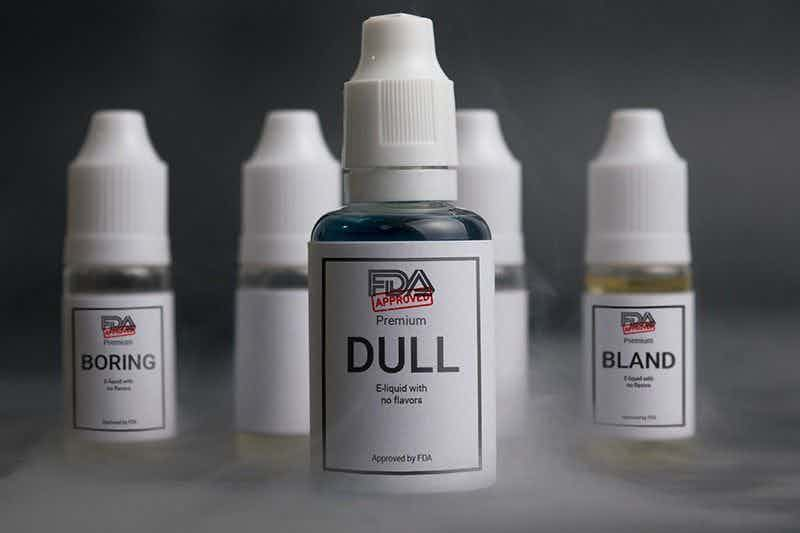Updates
Dec. 21 update The California law banning in-store sales of flavored vape and tobacco products took effect today, following a failed attempt by tobacco company R.J. Reynolds and vape and tobacco retailers to obtain an injunction from the Supreme Court that would have blocked the law. The new law bans sales in stores of vape products—with or without nicotine—in any flavor other than tobacco. It also prohibits sales of flavored nicotine pouches, lozenges, smokeless tobacco (including snus), menthol cigarettes and flavored small cigars. Hookah tobacco, premium cigars and pipe tobacco are exempted from the ban. The law does not ban online sales of flavored vaping products, although some California cities and counties may ban online sales themselves. There is also a federal law that prohibits most vape product shipping though the U.S. Mail, and UPS and Fedex also prohibit vape deliveries.
Nov. 11 update On Nov. 9, just a day after voters approved Proposition 31, the law was challenged in federal court by R.J. Reynolds and others.
Original article Nov. 9, 2022
With over 40 percent of votes counted, California voters appear to be on the way to overwhelmingly approve Proposition 31, which bans sale in stores of vaping and tobacco products containing non-tobacco flavors. So far, 62 percent of voters have supported the flavor ban.
Financial support for the ballot initiative came almost exclusively from billionaire anti-vaping activist Michael Bloomberg.
Prop 31 allowed voting residents to approve or reject a bill passed in 2020 by a huge majority of the California Assembly. The law was put on hold for two years after tobacco companies bankrolled a signature-collection campaign to put the legislation to the voters.
The flavor ban includes vapes, nicotine pouches and tobacco
The new law, which will take effect later this year, bans brick-and-mortar sales of all vaping products in flavors other than tobacco. The prohibition extends to nicotine-free e-liquid and so-called “flavor enhancers,” which probably includes one-shot DIY mixes.
Prop 31 would even ban flavored non-combustible nicotine products authorized for sale by the FDA and designated "appropriate for the protection of public health." (The FDA has not so far authorized any flavored vaping products, but flavored General snus and menthol IQOS refills have been authorized.)
The law also prohibits sales of flavored nicotine pouches (which are almost all flavored), menthol cigarettes, flavored small cigars, and flavored smokeless tobacco, including snus. The flavor ban exempts hookah products, pipe tobacco and cigars.
As expected, California will become the second state to ban the retail sale of all flavored tobacco and nicotine products, including those with marketing authorizations from FDA.
Very sorry to California vapers who will find it easier to buy Marlboros than e-liquid. pic.twitter.com/6nzzWISdzJ
— Gregory Conley (@GregTHR) November 9, 2022
The law does not ban online sales, but California law makes selling vaping products online—even from outside the state—an onerous process for retailers.
California joins Massachusetts as the only states to have banned flavored vaping products along with menthol cigarettes and flavored cigars. Three other states—New Jersey, New York and Rhode Island—currently have flavored vape bans (all passed in early 2020), but sales of menthol cigarettes were left untouched.
Bloomberg personally outspent the entire tobacco industry
Campaign for Tobacco-Free Kids President Matthew Myers says the passage of Proposition 31 “provides powerful momentum for similar action by other states and cities, as well as by the FDA, which has proposed rules prohibiting menthol cigarettes and flavored cigars.”
Despite being supported by just about every national and California public health and tobacco control organization, California Governor Gavin Newsom (who also won reelection yesterday) and most Democratic politicians, Myers specifically thanked only one person in the group’s press release.
For years the tobacco industry has preyed on young people, spending hundreds of millions of dollars to market candied-flavored products that are a known gateway to a lifetime of tobacco use, which is one of the leading contributors to disease and death across the U.S. 2/5
— Mike Bloomberg (@MikeBloomberg) November 9, 2022
“We are also grateful to Michael R. Bloomberg for the exceptional leadership he provided in this campaign,” Myers said. “No single individual has done more to fight tobacco use and save lives around the world.”
Bloomberg, the former New York City mayor with a net worth of about $77 billion, contributed nearly all of the $47 million spent by the Committee to Protect California Kids, which led the Yes on 31 campaign, according to Politico. The East Bay Times estimated it would take over 1,900 years of full-time work for the average American worker to earn as much as Bloomberg spent promoting Prop 31.
Californians Against Prohibition, the group opposing the law, has been almost entirely funded by tobacco giants Philip Morris USA (a division of Altria Group) and RJ Reynolds Tobacco Co. (a subsidiary of British American Tobacco). The two tobacco companies each contributed more than $9 million to the cause, seeking mainly to protect their menthol cigarette sales in the nation's largest state.

Jim McDonald
Vaping for: 13 years
Favorite products:
Favorite flavors: RY4-style tobaccos, fruits
Expertise in: Political and legal challenges, tobacco control haters, moral panics
Jim McDonald
Smokers created vaping for themselves without help from the tobacco industry or anti-tobacco crusaders, and I believe vapers and the vaping industry have the right to continue innovating to give everyone who wants to use nicotine access to safe and attractive non-combustible options. My goal is to provide clear, honest information about vaping and the challenges nicotine consumers face from lawmakers, regulators, and brokers of disinformation. You can find me on Twitter @whycherrywhy


